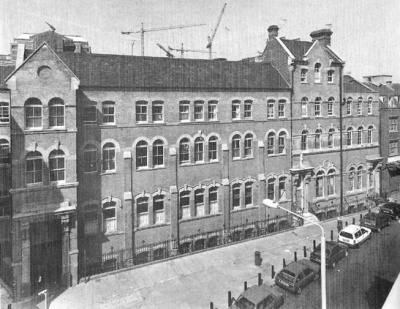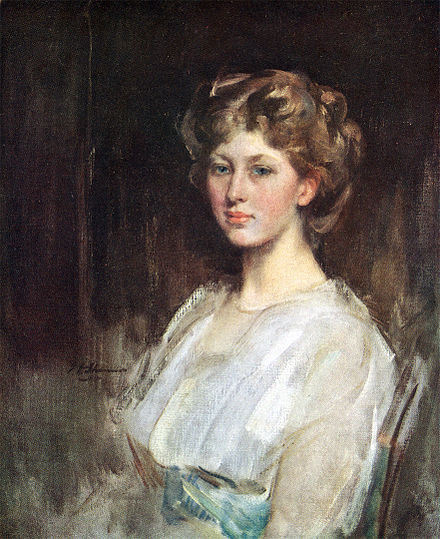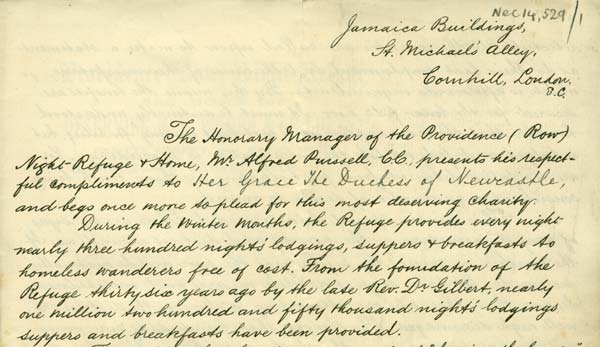The Benevolent Society for the Relief of the Aged and Infirm Poor. was the oldest Catholic charity in London founded in 1761 It’s a nice worthy Catholic, and City cause, and it’s good to see members of the family there. This year there weren’t that many, but at least Great Grandpa was there, even if he was the only O’Bryen that year. Also present were Uncle Wilfrid (Parker) his brother-in-law, his cousin Frank Harwood Lescher, and Frank’s cousin Joseph S. Lescher [by then a papal Count]. The only surprise is that John Roper Parkington wasn’t there, but maybe he had a cold.
The annual dinner of the Benevolent Society for the Relief of the Aged and Infirm Poor was held at the Albion, Aldersgate-street, on Monday evening. The Hon. Mr. Justice Walton presided, and there were also present the Bishop of Emmaus, the Bishop of Southwark, Sir Westby Perceval, K.C.M.G., Colonel Maguire, Major J. H. White, V.D. ; the Very Revv. Provost Moore, Canon Johnston, D.D., V.G., Canon Keatinge, Canon McGrath, Canon Murnane, Canon Pycke, Canon White ; Commendatore Hicks, K.C.S.G. ; Captain Shean ; the Revv. W. V. Allanson, D.3., Thomas Carey, Alexander Charnley, S.J., George Cologan, W. J. Condon, C. A. Cox, G. B. Cox, J. Crowley, George Curtis, E. du Plerny, J. Egan, Edmund English, E. Escarguel, M. Fanning, Dean Fleming, Roderick Grant, James Hayes, W. J. Hogan, D. Holland, S. E. Jarvis, 1.C., William L. Keatinge, Hugh Kelly, Michael Kelly, O.S.A., D.D., P. McKenna, E. B. Mostyn, E. F. Murnane, Edward Murphy, J. M. Musgrave, Francis J. Sheehan, Edward Smith, Francis Stanfield, J. S. Tasker, G. B. Tatum, Lea Thomas, S.M., Louis Toursel, Felix J. Watters, S.M., D.D., A. E. Whereat, D.D. ; and Messrs. Frank Beer, J. Nugent Burke, John Carnegie, John Christie, A. K. Connolly, James Connolly, John J. Connolly, J. A. Connolly, S, Frederick Connolly, John Conway, James Donovan, P. F. Dorte, LL.B., Cecil Dwyer, Reginald B. Fellows, M.A., H. M. Fisher, R. M. Flood, P. J. Foley, Francis T. Giles, Anthony Hasslacher, Charles Hasslacher, J. E. Hill, James D. Hodgson, S. Taprell Holland (hon. treasurer), Thomas Holland, Henry J. Hudson, John Hussey, William Hussey, J. Virtue Kelly, Joseph F. Lescher, J.P., D.L., F. Harwood Lescher, Austin Lickorish, Bernard McAdam, James P. McAdam (hon. secretary), J. M. McGrath, Ernest A. O’Bryen, Wilfrid W. Parker, R. J. Phillips, Herbert Plater, B. Rooney, L.L. Schiller, E. Simone, Joseph Sperati, Paul Strickland, Francis P. Towsey, Joseph S. R. Towsey, William Towsey, John M. Tucker, George Walton, J. Arthur Walton, George Wesley, A. E. White, Basil J. White, C. B. Wildsmith, M. J. Wildsmith, &c.
The Chairman, in proposing the first toast of the evening, ” His Holiness the Pope and his Majesty the King,” said : Through the world his Holiness is looked upon as the principal authority in spiritual matters, as his Majesty the King personifies the principal authority in temporal matters. Not many days since I had the honour of dining with the Goldsmiths’ Company, and the first toast, according to the ancient custom of the Company, was the Church and King. We translate that toast in the same spirit of loyalty. (Hear, hear.) I ask you to drink to the health of our Holy Father Leo XIII., to his health and his well-being. May that venerable life, which has been so fruitful of blessing to the Church and mankind, be still further prolonged to be a guidance to his children throughout the world. (Loud cheers.) One cannot forget that this is the first time for more than sixty years that the toast of the King has been proposed at the annual dinner of the Benevolent Society. The occasion carries our minds back to the number of years which that great Sovereign—the late Queen Victoria—ruled over this great realm with such magnificent results, and at the same time carries our minds forward with great expectations and great hopes. (Cheers.)
The toast was acknowledged with musical honours.
The next toast was that of ” Queen Alexandra, the Prince and Princess of Wales, and the other members of the Royal Family,” a toast which the Chairman remarked would arouse the same feelings of personal devotion as the previous toast.
The toast was received with enthusiasm.
THE SOCIETY.,
The Chairman rose and said : Gentlemen, I have now to ask you to drink to the success of the Benevolent Society. The Society has appealed to me very warmly and sincerely ever since I first knew it. In the first place it is a benevolent society in a very special sense. 1 think it is a most useful thing, a most excellent thing, that it should bring us together in pursuit of a charitable object, and I think it is also a good thing that it should bring us together in a friendly and social gathering. (Hear, hear.)
I am sure it is very true, as I have often heard it said by one whom we have lost, and for whom I shall always have the greatest possible reverence and affection—the late Lord Russell of Killowen—(cheers)—that if we are to succeed as we ought to do in this city one thing is wanted amongst Catholics, and that is greater unity. (Cheers.) The more we can see of each other, the more the laity can see of the clergy at gatherings like this the better it is for us and the stronger will be our position in this city, and the greater will be the success which we shall attain in every undertaking we have in hand. (Hear, hear.) The history of the Benevolent Society, although, as far as I can see, its records are not very voluminous, is very interesting. It was founded in 1761, and this takes our minds back to the time when to be a Catholic was to be a criminal, for a priest to say Mass was a capital offence, and for a Catholic to send a child to a Catholic school was an offence which might entail forfeiture of all he possessed. The Society couples us up and links us with the Catholics of old days, those who before the time of the establishment of the hierarchy and before Catholic Emancipation struggled and fought priests and laity for the faith. We are proud to know that we are now carrying on a work which was begun in the old days by the ” heroes “ who kept alive the faith. From the year 1761 we go to 1788 and ten years later, during which the Penal Laws had been repealed, at least to a very large extent. At the first annual gathering the amount subscribed was £ 53 Later on the Society met at ” The Five Bells,” Moorfields, and the annual gathering took place in “The Three Mariners,” Fore-street. Later on the meeting took place in Moorfields Chapel. In 1849 the amount subscribed at the annual dinner was £ 349. In 1857 the name of Canon Gilbert—(cheers)—who was so much revered not only by the Society, but by Catholics in all parts of the country, joined the Committee, and the name of the Rev. James Laid Patterson, now the Right Rev. Bishop of Emmaus, was included in the list. (Cheers.) Passing to 1861 we find the amount subscribed was £ 574.
ITS WORK.
And now I turn to more recent days, and I find that the amount spent and distributed during the last year was £1,484 13s. 61, besides some money for coals distributed at Christmas. I think we have reason to congratulate ourselves upon the success of this venerable and most useful Society. (Hear, hear.) It seems to me that there are two forms of benevolence to which objection cannot possibly be taken. One is the good work of assisting children in their education, and especially the poor children of the Catholic poor. (Hear, hear.) It is necessary that all Catholic children should have an efficient education in order to prepare them for the battle of life. (Hear, hear.) That is one form of good work which has been done in the past and in the way of building our poor schools. I am glad to see a spirit arising—it is a resurrection, it is a revival—of realising the importance of doing something for the education of our boys in our higher schools in the way of establishing exhibitions and scholarships which may assist a boy whose parents may not be in position to afford it, so that these Catholic boys may take their proper place in life. The other kind of work to which I allude is rendering assistance to those who have fought the battle and have failed. (Hear, hear.) That is a work which the Society undertakes. One of the saddest features of modern life is the necessity for something in the nature of old age pensions. Amongst Catholics in London this Society endeavours to give that assistance, and to do that most excellent work, of coming to the rescue of those who in their old age, by sickness, by misfortune, need the assistance of some charity. I know I shall not appeal to you in vain for subscriptions. We have 190 pensioners, we want to increase that number to 200. (Cheers.) I ask you to-night to support, as indeed you always do, but even more so this most deserving charity, and speaking personally it is a great pleasure to me to preside at the gathering. (Cheers.)
BISHOPS AND CLERGY.
Sir Westby Perceval proposed the health of “The Cardinal Archbishop, the Bishops, and the Clergy of the two Metropolitan Dioceses.” The speaker said : A note has been struck by our chairman as to the value of these gatherings from a social point of view, which appeals to us very forcibly. It is a sad want in Catholic London that so few opportunities are afforded Catholics to meet each other and to meet their clergy, and it is their health I submit to you this evening in the toast which I propose. (Cheers.) It is a very comprehensive toast, and when I was asked to propose it the first thought that entered my mind was the excellent opportunity for retaliation. (Laughter.) Most of us have sat at the feet of the clergy and had our little weaknesses exposed, but I have not been very successful in discovering the weaknesses of the clergy. (Laughter). There was a certain prophet of old who was told to curse and ended by blessing, and that is the position in which I find myself this evening. (Laughter.) We as ” Britons “ take a deep and practical pleasure in our bishops and our clergy, and we cannot show our love in a better way than by fostering and maintaining that spirit of loyalty. (Loud cheers.)
SPEECH BY THE BISHOP OF EMMAUS.
The Bishop of Emmaus in a humorous speech responded. He had long, he said, been a member of the Benevolent Society. In addition to carrying on the very praiseworthy work of assisting the poor, the Society had promoted a cordial feeling between clergy and laity which was, he thought, a distinguishing mark of English Catholicity. (Cheers.)
REPLY BY THE BISHOP OF SOUTHWARK, The Bishop of Southwark also responded. He said : The thought I am sure that must be uppermost in the minds of all present must surely be an expression of love for his Eminence the Cardinal Archbishop and of a desire that he may be long spared. (Hear, hear.) I certainly know of no life more precious to the Catholic Church in England at the present day than that of his Eminence Cardinal Vaughan. (Hear, hear.) He has given to us, as I often tell him, a marvellous example of courage in works he has undertaken, and particularly in the undertaking of the building of his magnificent cathedral. (Hear, hear.) He had not much encouragement at the beginning, but he has faced that burden and he has carried it on nobly, and the wish of everyone to-night is that he may be spared to see the cathedral opened. (Cheers.) Speaking for the diocese of Southwark, I think it is not badly represented this evening. (Hear, hear.) As I look round the room I think I can say that we of Southwark are trying to do our duty to the Society. (Hear, hear.) I hope the opportunity we get year by year to meet together—the clergy and the laity—may always be maintained to the very full, and may always promote those cordial relations which do exist between the clergy and the laity of this country. (Cheers.) As we look around upon this city—as I look myself upon the rapidly developing suburbs of South London, in which there has been an increase during the past year of 230,000 souls—we are able to realise what a great mission we Catholics, clergy and laity, have before us, if the work is to be well done and if we are to produce upon this city, and to carry it into action, the influence which we ought to have. (Loud cheers.) One great element in our work will be the clergy and laity more closely united together. (Hear, hear.) I do not know what the future is to bring forth, whether the laity are to be called upon to take a more active part in the temporal administration of our missions—(laughter)—but I am sure whatever call is made upon them they will respond generously. (Hear, hear.) Of this I am certain, that as we live we must inevitably see an enormous increase in the influence of the Catholic Church throughout the cities of London and Westminster, and throughout the Borough of Southwark. (Cheers.)
THE CHAIRMAN.
Mr. Joseph Francis Lescher proposed the health of the Chairman. He said : When the elevation of Mr. Walton was announced the Catholic world was exceedingly gratified. (Cheers.) The men of Stonyhurst rejoiced exceedingly, and the commercial community of this great city were immensely pleased—(hear, hear.)—because they knew it was a recognition of a most honourable and straightforward career. I speak as only one of the commercial community of this city, and I say it was a distinct gain to us that Mr. Justice Walton should have this dignity and honour conferred upon him. (Hear, hear.) I say that the high esteem of the Bench will lose nothing of that grand record which has been handed down for generations. Looking abroad and at home, we may be sure that that high standard of excellence, which has been the one great feature of the courts of England, will continue to remain so long as such appointments are made. (Cheers.)
The Chairman thanked the last speaker for the kind—the too flattering—words which he used in proposing the toast. I am glad, indeed, to see here to-night not only my old friend, Mr. Lescher, but also my old master, Father Charnley. (Cheers.) It carries me back to my old days at Stonyhurst, and I shall always, and indeed we all should, remember the debt we owe to Stonyhurst, and certainly if I can ever do anything to assist and promote the high standard of education not only in my own school but in all our higher grade schools, I shall be most happy to do so. (Cheers.) Mr. Lescher has said a number of kind things about me, but I would remind him of the old proverb, ” It only takes six months to turn a good barrister into a bad judge “—(laughter)—and I am often inclined to say ” wait.” I cannot feel ashamed of the work I did at the Bar —(loud cheers)—and I sincerely and honestly felt a great deal of regret in saying good-bye to my old life, and I still hope I may be of some use to my old friends and to Catholics. (Cheers.) have now the pleasure of announcing the result of the collection which amounts to £1,031. (Cheers.)
Mr. Paul Strickland proposed the toast of “The Stewards.:” He said : Some years ago I had the privilege of being a pupil of Mr. Justice Walton, and I am glad to be able to give expression to the profound joy and rejoicing of Catholics that be should have been promoted to the Bench. If I may be allowed I should like to make an addition to the proverb quoted by the hon. chairman, and it is that after a few years a judge has been in the past promoted to be Lord Chief Justice. (Cheers.)
Mr. W. Towsey briefly responded for the stewards. He remarked that the stewards would always endeavour in the future as they had in the past to make these gatherings attractive to the general body of Catholics and the more there were of them the better. (Hear, hear.)
The above text was found on p.20, 30th November 1901 in “The Tablet: The International Catholic News Weekly.” Reproduced with kind permission of the Publisher. The Tablet can be found at http://www.thetablet.co.uk .








